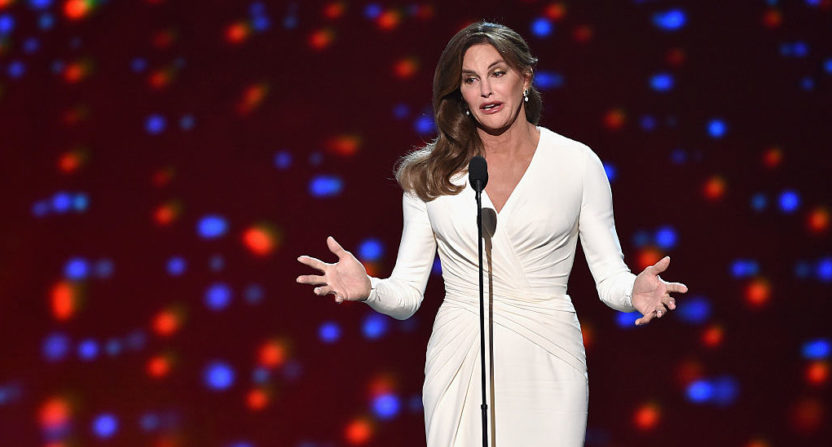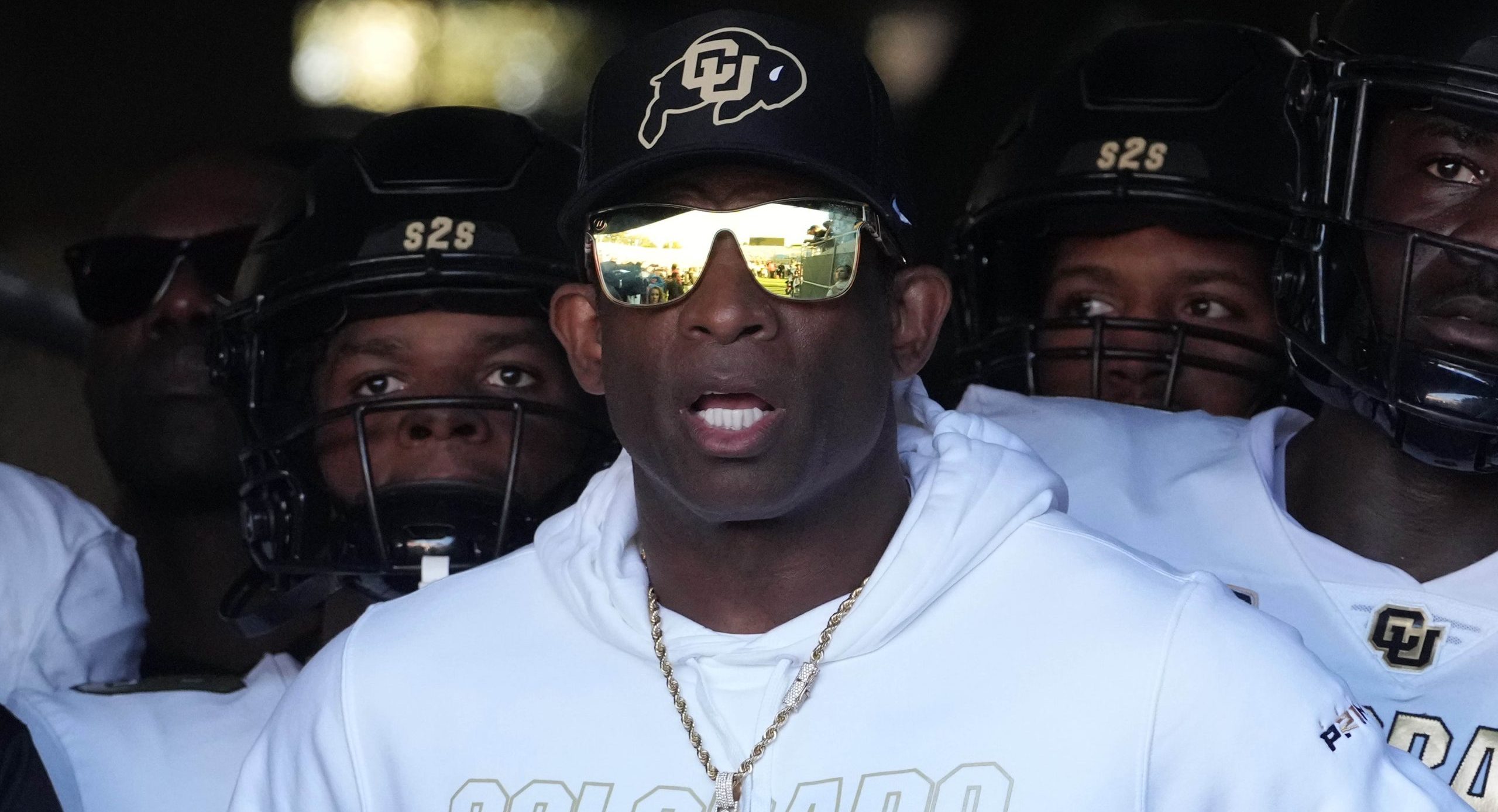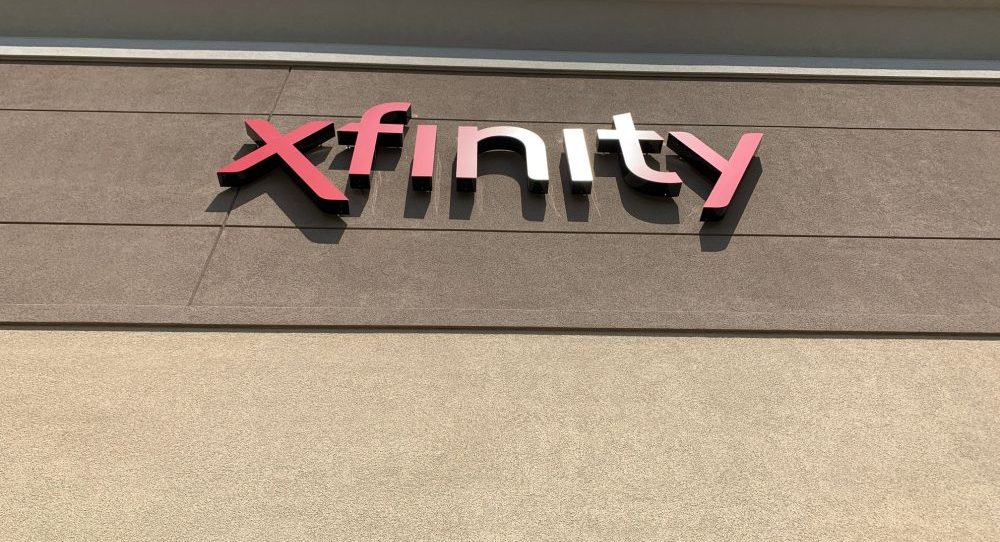Two years ago this week, Caitlyn Jenner strode to the ESPYS stage in Downtown Los Angeles in an elegant white dress, embraced presenter Abby Wambach and tearfully accepted the Arthur Ashe Courage Award.
“All across this country right now, at this very moment, there are young people coming to terms with being transgender,” said the Olympian-turned-reality-star, who had recently announced her transition from male to female. “It’s not just about one person. It’s about thousands of people. It’s not just about me. It’s about all of us accepting one another.”
Today—one presidential election, several bills restricting transgender rights and dozens of ESPN layoffs later—Jenner’s moment at the ESPYS casts an odd shadow. Many Americans remember it as a bright moment in the movement for transgender acceptance, particularly within the sports world. But a vocal segment of the American population views it as something else: a rebuke of conservative values and a sign that ESPN had chosen a side in a deepening political divide.
Based on evidence both empirical and anecdotal, including a poll tracing Republican attitudes toward ESPN, it’s clear that Jenner’s award was a key moment in ESPN’s history. From that night on, a large swath of Americans viewed the country’s biggest sports network as propagating a nefarious liberal agenda. Spurred on by Donald Trump’s anti-media message, social conservatives declared war on ESPN, until the claim that ESPN was “too liberal” burst from conservative websites to mainstream newspapers and jumped from Facebook comments to widely aired sports talk radio.
Whether or not ESPN actually is too liberal has become almost beside the point: Thousands of people perceive that ESPN is too liberal, creating a PR headache—or worse—for the network.
To examine this phenomenon and what it means for the network’s future, Awful Announcing spoke to people in and around sports media about the legacy of an award that two years later lingers atop a surprising number of minds.
Dylan Gwinn first decided ESPN was too liberal in 2003, when conservative commentator Rush Limbaugh was forced to resign from his role as an NFL analyst following controversial comments about Donovan McNabb and black quarterbacks.
Since then, Gwinn has bashed ESPN repeatedly, on his Houston-based radio show, in his 2015 book about liberal bias in sports media and in his current role as sports editor of Breitbart.
Now, Gwinn’s belief in ESPN’s insidious left-wing ideology has gone mainstream, cosigned in newspapers like the Wall Street Journal, Orlando Sentinel and Chicago Sun-Times. The New York Times has attempted to parse ESPN’s politics, as has the network’s own ombudsman. The narrative has gotten loud enough that ESPN recently commissioned a study to determine whether it was perceived as too political, finding that 64 percent of those surveyed were comfortable with ESPN’s blend of sports and politics.
Naturally, Gwinn is pleased to see his viewpoint become part of a national dialogue. And though he points to a number of incidents that, in his view, showed America how liberal ESPN is, Jenner at the ESPYS stands out above the others.
“If there’s a Rosetta Stone moment in the history of ESPN’s blatant liberalism or whatever, I think Caitlyn Jenner probably has to be it,” Gwinn told Awful Announcing.
Jenner first became part of ESPN’s story on June 1, 2015, when Jim Miller reported in Vanity Fair that she would receive the network’s Arthur Ashe Courage Award at the upcoming ESPYS. While ESPN undoubtedly anticipated some backlash, executives could have hardly predicted the wave of anger to come.
Almost immediately, the internet exploded with reasons Jenner wasn’t deserving of the award. And it wasn’t only conservative outlets holding the pitchforks.
Cincinnati Enquirer columnist Paul Daugherty was among the many to suggest the award should have gone to terminally ill basketball player Lauren Hill. Bob Costas—whose politics will never be confused with Sean Hannity’s—called the decision to honor Jenner, “a crass exploitation play.” The late Frank Deford suggested Jenner hadn’t “overcome” all that much since she had lots of money and a reality TV show. Anonymous “insiders” wondered whether the award was a quid pro quo for Jenner agreeing to be interviewed on ABC. (ESPN flatly denies this.) Boston radio personality Gerry Callahan tweeted a photo of double-amputee U.S. veteran Noah Galloway, claiming he was “runner-up” for the Arthur Ashe Courage Award. (This turned out to be patently false. ESPN does not declare runners-up for the honor.)
Caitlyn Jenner wins Arthur Ashe Courage Award.
And the runner-up is …. pic.twitter.com/DKUdnPT8Gx— Gerry Callahan (@GerryCallahan) June 1, 2015
For more than two decades, no one had given a hoot who won which ESPY. Now masses of people who couldn’t name a single previous Arthur Ashe Courage Award recipient had viciously strong opinions on who should get this one.
When the night of July 15 arrived, Jenner delivered an impassioned speech, reciting names of transgender children who had committed suicide and begging the American public for acceptance—not of herself, necessarily, but of transgender people in general. As the ESPN cameras panned, everyone from Brett Favre to Paul Pierce to Hope Solo stood and applauded.
Among those moved by the speech were Christina Kahrl and Courtney Pollack, ESPN’s only publicly out transgender employees. To them, Jenner’s courage was obvious. She, like almost everyone who comes out as transgender, had come to terms with a complicated identity, risked losing friends and family and subjected herself to derision from those who didn’t understand her. Now she was doing what she could to help a community for which acceptance can be a matter of life and death. And she was doing it on ESPN’s platform.
“It gave me a sense of pride in the company in terms of how they embraced it,” Pollack, an infrastructure support specialist, says now. “She’s taking everything and saying, ‘This is who I am.’ And I think that was a pivotal moment, especially for the trans youth.”
Kahrl, an MLB editor at ESPN, says Jenner’s moment at the ESPYS was important because it gave Americans who had watched Jenner compete at the 1976 Olympics a personal connection to trans issues.
“Bruce Jenner the athlete was somebody that a lot of people—particularly a lot of cisgender, straight, white men—grew up with, grew up admiring, grew up respecting,” Kahrl says. “The idea that Bruce Jenner was becoming Caitlyn Jenner became an important touchpoint for a lot of fans, athletes and journalists to bring this issue home to them.”
To thousands of Americans, ESPN’s choice to honor Jenner was inspiring. The network was, symbolically at least, opening its arms to one of the most marginalized communities in America. ESPN, an important cultural institution, was not only showing acceptance toward a transgender woman but also welcoming her into its biggest night, handing her a microphone and letting her speak directly to young people in search of a role model. For most supporters of transgender rights, this wasn’t about politics—after all, Jenner was a loyal Republican and a vocal Ted Cruz supporter—it was about basic decency and understanding.
But, of course, many people do not consider transgender rights an applause-worthy cause. A March survey from the Public Religion Research Institute found that 39 percent of Americans and 59 percent of Republicans support laws requiring people to use the bathroom matching the sex assigned to them at birth. And to many of those people, ESPN’s recognition of Jenner was nearly unforgivable.
Conservatives interviewed for this story talked about Jenner’s distance from her sports career and about the virtue of other candidates ESPN could have chosen for the Arthur Ashe Courage Award. But, as Gwinn readily admits, there was a more basic force at work: ESPN was supporting a cause many on the right didn’t agree with.
“They chose to seize on what has been one of the real champion causes of the left and the social justice movement, which is this transgenderism,” Gwinn says. “And they chose that moment—that huge moment—to bestow an award on it and to really put their stamp on it. And for a lot of people, I really think that was a turning point.”
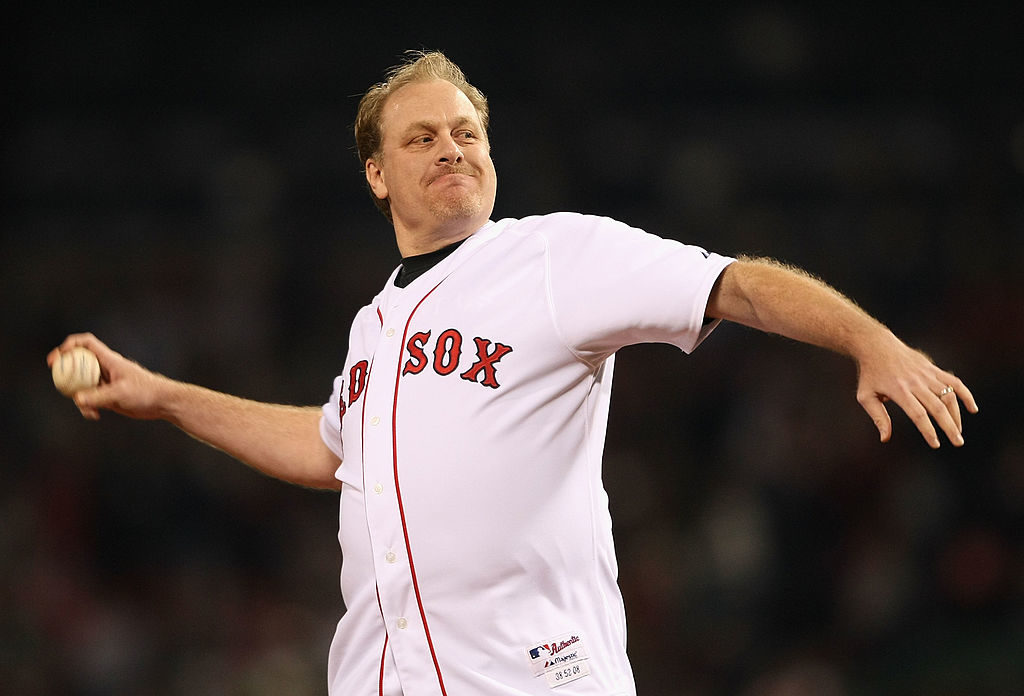
Jim Miller, who wrote a book about ESPN in 2011 and has been an authority on the network ever since, says he first heard that ESPN was too liberal in 2014. The complaint, Miller says, popped up when ESPN aired a clip of newly drafted football player Michael Sam kissing his boyfriend and then gave him the same Arthur Ashe Courage Award that Jenner would win a year later.
Nine months after Jenner’s speech at the ESPYS, ESPN fired baseball analyst Curt Schilling, in part due to a transphobic meme he shared on Facebook. The network said the decision owed to Schilling’s offensive behavior on social media over a period of months. But to conservatives, it was further evidence of a political agenda.
“The whole issue—transgender, gay, lesbian—that seemed to be in the minds of many, or at least some, who were making these allegations about ESPN,” Miller says. “[People thought] if they were supporting equal rights for transgender people or gay or lesbian couples, then that meant that they were a liberal broadcasting company.”
It didn’t help that the timing dovetailed perfectly with Trump’s rise. Trump officially announced his presidential candidacy one day after the 2015 ESPYS and crafted his anti-media message just as right-wing resentment toward ESPN was growing. He emboldened conservatives to speak out against mainstream outlets they viewed as biased—The Worldwide Leader in Sports included.
At the same time, transgender rights were becoming a front-page issue across the country. In March 2016, North Carolina passed its infamous “bathroom bill,” requiring that individuals use the bathroom matching the gender assigned to them at birth. Legislators eventually softened the bill slightly—after the NCAA and NBA pulled events from the state and voters replaced the governor, Pat McCrory, who had signed it. Similar bills have been introduced in numerous other states, and though none has been passed into law, they’ve all helped turn transgender identity into a political battleground.
Days after Trump won the presidency in November, Newsweek published an essay by sportswriter John Walters headlined “How Caitlyn Jenner swung the election for Donald Trump.” In the piece, Walters argued that people in Middle America felt alienated by “uncompromised progressivism” on the nation’s coasts and cited ESPN’s decision to award Jenner as an example of the “pendulum of pop culture” swinging toward a “progressive agenda.”
Walters says now that even if his headline wasn’t meant literally, Jenner’s moment in the spotlight did have a radicalizing effect.
“This was a tipping point,” Walters told Awful Announcing. “This was the straw that broke the camel’s back, when you’re asking America to cheer the courage of someone making a private decision—and that’s fine—but he hasn’t been in the news as an athlete for 40 years. He’s been in the news as a Kardashian for the past five to 10 years.”
Walters says many conservatives, including in his family, resented being “lectured” about transgender rights.
“I think there’s a large group of people who don’t care, don’t want to know and don’t want it pushed at them. And that’s what this was,” he says. “It seems like ESPN was working so hard to tell you, the American viewer, what your position should be on something.”
Data supports the idea that conservatives disliked, as they saw it, ESPN forcing a “liberal” cause on them. A recent YouGov study found that Democrats and Republicans held roughly equal views of ESPN until the summer of 2015 when, in the wake of Jenner’s moment at the ESPYS, GOP approval of the network dived. After recovering gradually, Republican opinion plummeted again the following April when Schilling was fired and conservatives were given reason to think the Jenner award was more than a blip.
LGBTQ issues clearly were not the only cause of conservative backlash. Those interviewed for this story also cited ESPN’s treatment of Tim Tebow, its employment of Keith Olbermann, its apparent chumminess with Barack Obama and its coverage of Colin Kaepernick, plus “feminism” and a “race obsession.” Some ESPN-defenders allege that conservatives also resent the network for showcasing non-white and non-male voices more than other media companies do.
But many of those dynamics were in place long before Jenner won her ESPY and didn’t spark the type of widespread backlash we’ve seen over the past two years. Maybe the tinderbox was in place before Jenner, but it took a transgender woman accepting an award for courage to light the flame.
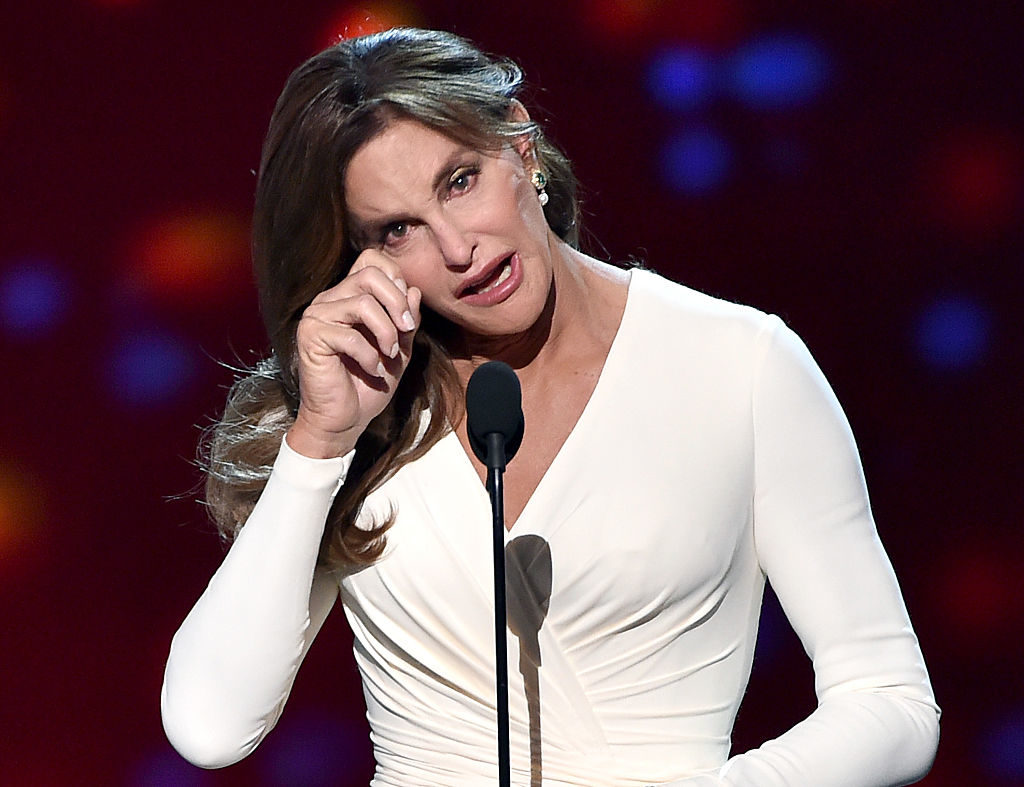
When ESPN laid off 100 front-facing employees at the end of April, a chorus of industry analysts blamed the cuts on rampant cord-cutting and bloated rights fees. Insiders agreed that ESPN had overpaid for live sports, leaving the network stretched thin when consumers everywhere canceled (or never initiated) their cable packages. The layoffs were an attempt either to save money or a signal to shareholders that Disney was taking ESPN’s problems seriously.
But despite that consensus, the dominant narrative around ESPN’s layoffs, particularly among conservatives, was the network’s politics.
Breitbart wrote that ESPN’s “leftist platform” had turned “headwinds into a hurricane.” The National Review suggested the layoffs should be “a wake-up call about politicizing sports.” Writing in the Wall Street Journal, ex-ESPNer Jason Whitlock blamed Deadspin for ESPN’s supposed leftward swing. Politico examined whether politics had turned off conservatives from ESPN, citing Jenner in its headline. And longtime ESPN antagonist Clay Travis practically performed a victory lap on his Outkick the Coverage site.
“Middle America wants to pop a beer and listen to sports talk, they don’t want to be lectured about why Caitlyn Jenner is a hero, Michael Sam is the new Jackie Robinson of sports, and Colin Kaepernick is the Rosa Parks of football,” wrote Travis, who declined comment for this article. “ESPN made the mistake of trying to make liberal social media losers happy and as a result lost millions of viewers.”
But Travis and others who blamed the layoffs on liberalism run amok were essentially pointing to karma and nothing else. In a world of cable bundles, Miller notes, any conservatives wishing to cancel their cable subscription out of anger toward ESPN would also be canceling, for example, Fox News.
“I think it’s patently absurd and actually financially naïve to try and connect any kind of political agenda to those layoffs,” Miller told Awful Announcing. “I see no empirical evidence whatsoever.”
The persistence of the “liberal ESPN” storyline as an explanation for the layoffs shows how ingrained the belief in the network’s bias has become. Swaths of Americans believe ESPN is pushing a political agenda, and there seems to be no changing their minds.
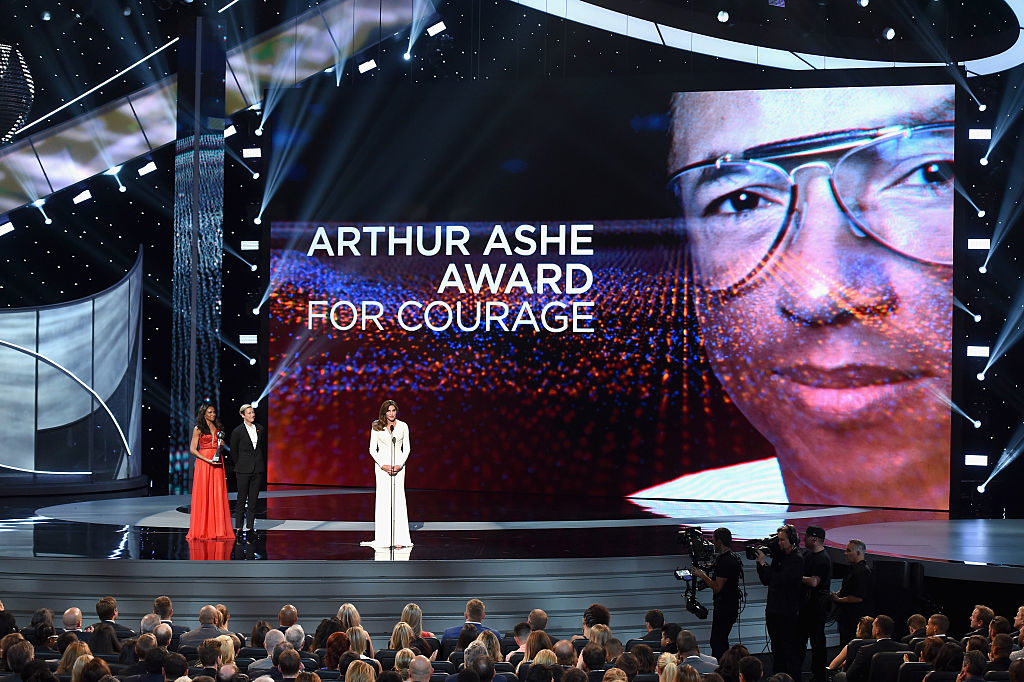
Of course, ESPN is far from the only ostensibly apolitical media outlet to be labeled as liberal. Thanks to Trump’s well-publicized distaste for the “mainstream media,” every publication left of Infowars has dealt with with the accusation to some extent or another.
But ESPN is a sports channel. The vast, vast majority of its programming concerns players, teams and coaches. For every analyst who talks about social issues on air, there are plenty who stick to Xs and Os. For every segment asking why Kaepernick remains a free agent, there are numerous about NFL players who have roster spots. When people say ESPN should stick to sports, they seem to ignore that an overwhelming portion of the time, ESPN does stick to sports. Of the dozens of headlines on ESPN.com at any moment, rarely can more than one or two be defined as at all “political.” Often, none can.
And given that quote-unquote political content makes up only a fraction of ESPN’s content, it shouldn’t be hard to avoid. If you’re sick of hearing about Kaepernick or think athletes dissing Trump is fake news, you can pretty easily keep away from those subjects. In the worst case, you have to change the channel for a few minutes.
And that gets us back to Jenner.
The 2015 ESPYS—broadcast on ABC for the first time, with Jenner as the headliner—drew about 2.2 million viewers. That was a ton for an ESPYS show, but only about a fifth of the average Monday Night Football broadcast on ESPN. Most sports fans didn’t actually see Jenner receive her award, yet ESPN’s critics on the right continue to cite it as Exhibit A in why the network is unwatchable. To them, the moment seems to have violated a sacred principle.
Take Matt Philbin, an editor at Media Research Center, a site that claims to expose liberal bias in mainstream press. Philbin says he wasn’t “upset” at ESPN’s decision to honor Jenner, but two years later his objections remain stubbornly strong.
“We’re celebrating somebody who’s coming out as transgender. That’s all it was,” Philbin says. “This guy had not run a race in 35 years. He had not been an athlete for 35 years or whatever it was. There was absolutely no reason beyond scoring political points and, basically, virtue-signalling.
“It’s ideological, it’s political,” he added. “It’s something a sports network shouldn’t be doing. I think you celebrate sports, you don’t celebrate identity politics. But they celebrate identity politics, and it creeps into everything they do.”
But what Philbin sees as “identity politics,” another person might view as simply recognizing and celebrating the humanity of someone different. When conservatives decry that ESPN is too liberal, they don’t mean that the network advocates for a universal basic income or forces employees to read Das Kapital. They mean that people like Caitlyn Jenner and Michael Sam sometimes get a microphone, while people like Curt Schilling, who disrespect them (and others), increasingly don’t. That’s what Philbin, Gwinn and others with similar ideologies won’t stand for.
Jemele Hill, co-host of SC6 and a favorite punching bag of ESPN detractors, has observed a suspicious correlation between who has a platform on ESPN and how certain viewers feel about the network.
“I notice those accusations seem to become more intense as you’ve seen more people of color, more women, more diversity in our network in very key positions,” Hill told Awful Announcing. “Some people, when they accuse us of that, they’re really saying that ESPN has become this liberal network because they’re promoting more black people and more people of color.
“People act like Caitlyn Jenner got up there and broke down the Affordable Care Act or that we do that every day on our network. Those are political topics. [Jenner’s identity] is not a political topic,” she added. “That’s why it’s really interesting that people have started to link diversity and liberalism, as if diversity is inherently liberal.”
Hill suggests the narrative that ESPN is too liberal comes largely from ESPN’s competitors and says her bosses at the network seem to assume it will “tire out” eventually. But it’s fair to wonder, what if it doesn’t?
A faction of the American right wing has made clear that if ESPN amplifies LGBTQ voices, even occasionally, it will yell, scream, tweet and threaten to boycott. The same goes for defending athlete-activists, questioning racist logos and promoting gender equality. If the Trump-fueled anti-media groundswell continues, the anger toward ESPN will only grow, as will pressure on the network to keep social issues off its airwaves. With ratings already wavering amid changes in how Americans consume news and sports, ESPN can ill afford to lose many viewers. All those people on Twitter claiming they won’t watch ESPN on principle may be blowing smoke—or they may not. Conservative media analytics firm Deep Root recently reported that Republicans in a select city (Cincinnati) already made up a smaller share of ESPN’s audience in 2016 than in 2015.
An ESPN spokesperson told Awful Announcing that the network fully stands by its decision to honor Jenner, but given the backlash her award inspired, it’s hard to imagine ESPN won’t hesitate slightly before making such a statement again. (Executives Maura Mandt and Connor Schell, who chose Jenner for the Arthur Ashe Courage Award back in 2015, declined to comment for this article.) The network recently brought back controversial Monday Night Football singer Hank Williams—once fired for comparing Obama to Adolf Hitler—leading some to suggest it was reaching out to conservatives to mend its reputation on the right.
For now, ESPN doesn’t have a serious competitor, so aggrieved viewers have few places to run. But if FS1 finds its footing, Barstool’s empire grows or a new network emerges, could ESPN’s market share shrink among conservatives? Could sports television become hyperpolarized the way cable news has? It won’t happen tomorrow, and it probably won’t happen in the next few years, but with an anti-media current running through the American right, conservatives won’t suddenly flock back to ESPN unless the network changes to accommodate them.
And so it seems that ESPN has a choice: It can make people like Caitlyn Jenner feel welcome in the sports world, or it can keep its right-wing audience. Doing both just might be impossible.

